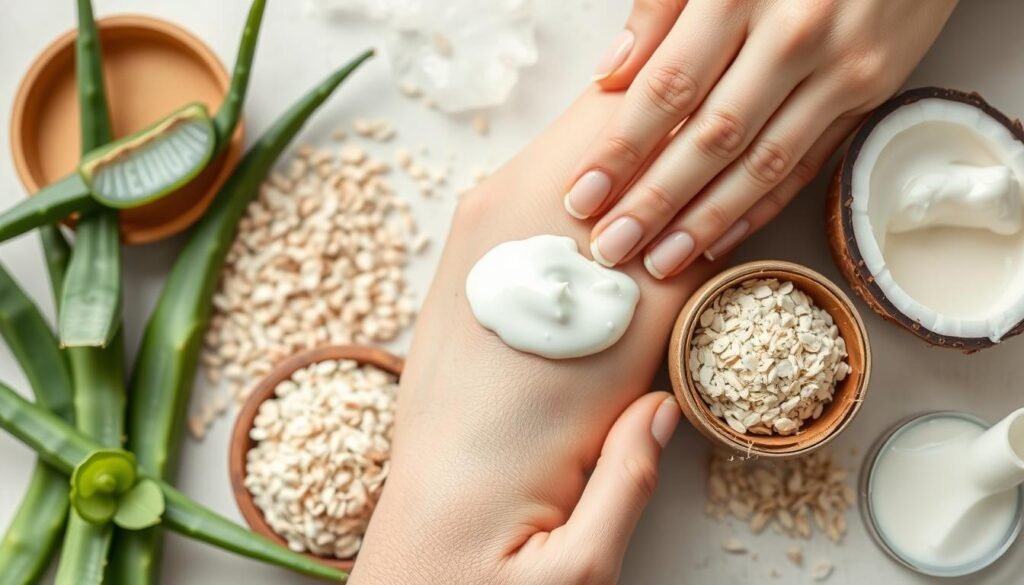Nearly 10% of people in the United States suffer from eczema. This is a skin condition that causes inflammation and intense itching. Quick action is key when a flare-up happens. Without it, things could get worse quickly. This article offers detailed advice on handling eczema flare-ups.
We will cover ways to get quick relief and how to control it long-term. You’ll learn how to find out what triggers your eczema and ways to soothe your skin. These tips aim to help those dealing with eczema find some peace and start healing.
Key Takeaways
- Eczema flare-ups require immediate attention to minimize severity and improve recovery.
- Topical steroids, when used correctly, can effectively control flare-ups.
- Maintaining a diary of symptoms may enhance eczema management by identifying patterns.
- Self-care practices, such as hydration and stress management, play a crucial role in reducing flare-ups.
- Wearing breathable fabrics and using fragrance-free products help prevent skin irritation.
- Consulting a healthcare professional can lead to personalized eczema management strategies.
Understanding Eczema and Its Symptoms
Eczema affects over 31 million people in the U.S. It shows up in different ways. Atopic dermatitis is the most common type, affecting millions of adults and children. It’s important to know the symptoms and types of eczema for good care.
Common Symptoms of Eczema
Itchy skin is a key sign of eczema. This itching often gets worse at night. Because of this, about 22% of adults with eczema find it hard to sleep. Eczema’s look can vary:
- Red, inflamed patches on the skin, like the eczema on neck.
- Dry, thickened skin from too much scratching.
- Small, raised bumps that may ooze fluid if scratched.
Eczema’s relief is sometimes short-lived, with flare-ups that can continue for weeks. This shows the need for constant care.
Types of Eczema and Their Differences
Knowing the different types of eczema helps in finding what causes it and how to treat it. Here are some common types:
| Type of Eczema | Description | Commonly Affected Areas |
|---|---|---|
| Atopic Dermatitis | It’s the most usual form, often beginning in childhood. | Face, neck, inner elbows, and behind knees. |
| Contact Dermatitis | Occurs from direct touch with irritants or allergens. | The skin area that touched the irritant. |
| Dyshidrotic Eczema | Mainly on hands and feet, it can cause blisters. | Palms and soles. |
| Neurodermatitis | Features localized patches instigated by itching. | Neck, head, legs, and arms. |
Identifying these types and their symptoms helps people find the right treatments. This can ease their discomfort effectively.
Recognizing Triggers of Eczema Flare Up
Knowing what sets off eczema is key to managing it well. What causes flare-ups varies from one person to the next. This means each person faces their own set of challenges. Some well-known irritants for eczema include harsh soaps, pet dander, latex, and certain foods that cause allergies. Clothes made from wool or polyester can also irritate the skin, especially around the neck. This makes finding treatments for neck eczema very important.
Common Irritants and Allergens
Allergens and irritants play a big role in triggering eczema. Getting too exposed to things like dust, smoke, and pollen can make eczema worse. People working as hairstylists or mechanics might get eczema more because of contact dermatitis. Stress is another big factor that can make itching and swelling worse.
Environmental Factors Affecting Eczema
It’s important to understand how the environment affects eczema. Extreme weather, like too much cold or humidity, can cause flare-ups. Keeping your living space comfortable is crucial for your skin’s health when eczema acts up. The mix of environmental triggers and personal situations makes it vital to know what affects your eczema. Checking out educational resources can help you manage eczema better.
Effective Moisturizing Strategies
Moisturizing right is crucial if you have eczema, especially atopic dermatitis. This condition makes skin dry and inflamed because the skin barrier doesn’t work well. Keeping skin moist is key to stop flare-ups and ease symptoms. So, picking the right moisturizer is a big part of treatment.
The Importance of Hydration for Eczema
Hydration is a must for eczema sufferers. Keeping skin moist stops it from getting too dry, which is bad for eczema. After you bathe, put on emollients to lock in moisture. This also helps with itching. Bathing in lukewarm water for 10 to 15 minutes helps hydrate dry skin.
Using the “soak and seal” method with moisturizers can cut down on flare-ups. Put on moisturizer within 3 minutes after bathing to keep the most moisture in. For more tips, check here.
Best Moisturizers for Eczema-Prone Skin
Finding the right eczema moisturizer is a game-changer. Look for products with emollients like ceramides, shea butter, and hyaluronic acid. Brands like iS Clinical and SkinCeuticals have stuff just for eczema skin. Ointments work best because they have lots of oil. They keep moisture in really well. Creams are also good but less oily. Lotions aren’t great because they dry fast and the skin doesn’t stay moist.
| Type of Moisturizer | Oil Content | Recommended Use |
|---|---|---|
| Ointment | Highest | Best for sealing moisture |
| Cream | Medium | Suitable for less greasy feel |
| Lotion | Lowest | Not recommended for eczema |
Adding good moisturizing habits to your daily routine helps manage eczema. It also prevents new flare-ups.
Cleaning your Skin Safely
When managing eczema, choosing the right cleansing method is key. If you have eczema, you know your skin can get very dry. It’s important to use products that clean without taking away your skin’s natural moisture.
Eczema safe cleansers are made to keep your skin moist and prevent irritation.
Gentle Cleansing Products to Use
People with sensitive skin should pick mild, fragrance-free cleansers. These products are hypoallergenic and made just for gentle care. Here are some top choices:
- CeraVe Hydrating Cleanser
- Vanicream Gentle Facial Cleanser
- La Roche-Posay Lipikar Wash Cream
- Neutrogena Ultra Gentle Hydrating Cleanser
- Aquaphor Gentle Wash
Bathing Tips for Eczema Relief
Bathing is crucial for those with eczema. Here are some tips:
- Keep showers short, use lukewarm water, and aim for 10 to 15 minutes.
- Add colloidal oatmeal or bath oils to the water for extra moisture.
- After drying off, quickly apply a moisturizer that’s rich in oil, using the “Soak and Seal” method.
- To prevent your skin from drying out, don’t bathe more than once a day.
Using these tips every day can control eczema symptoms. Folks with atopic eczema often need lots of moisturizer, sometimes using two big bottles a month. Gentle skin care for bathing and cleaning helps keep the skin healthy and lowers the chances of flare-ups.

| Product Name | Type | Key Features |
|---|---|---|
| CeraVe Hydrating Cleanser | Foaming Cleanser | Contains ceramides and hyaluronic acid, hydrates while cleansing. |
| Vanicream Gentle Facial Cleanser | Facial Cleanser | Free of dyes, fragrance, and parabens, suitable for sensitive skin. |
| La Roche-Posay Lipikar Wash Cream | Body Cleanser | Rich in lipids and suitable for dry skin, restores skin barrier. |
| Neutrogena Ultra Gentle Hydrating Cleanser | Facial Cleanser | Non-irritating, hypoallergenic, and effective for sensitive skin. |
| Aquaphor Gentle Wash | Body Cleanser | Recommended by dermatologists, hydrates while cleaning. |
Clothing Choices for Eczema Sufferers
Choosing the right clothes can greatly improve eczema management and comfort. Knowing the best eczema clothing choices means figuring out which fabrics for eczema are ideal. This is very important during flare-ups, as the wrong clothes can make symptoms worse.
Best Fabrics for Sensitive Skin
People with eczema should look for soft, breathable fabrics that offer relief. Below is a list of the best fabrics:
| Fabric | Benefits | Considerations |
|---|---|---|
| Cotton | Soft, breathable, highly absorbent | May shrink if not washed properly |
| Silk | Soft, breathable, thermoregulating | Harder to wash, can be stained by skincare products |
| Bamboo | Soft, antibacterial, moisture-wicking | Manufacturing may have environmental impacts |
| Merino Wool | Ultrafine fibers, good moisture management | Not suitable for all; some may still experience irritation |
| Lyocell (TENCEL) | Soft, biodegradable, produced with fewer chemicals | Availability may vary |
| Polypropylene | Moisture-wicking, affordable | Less breathable than natural fibers |
Clothing Tips During Flare Ups
Choosing clothes during eczema flare-ups needs careful thought. Here are some helpful tips:
- Opt for loose-fitting garments to minimize friction and irritation.
- Wash new clothing with gentle detergent to remove potentially harmful chemicals.
- Layer during colder months with soft, moisture-wicking fabrics like silk or ultra-fine merino wool.
- Be cautious of fabric blends; natural fibers are often recommended over synthetic ones.
- Choose breathable materials in the summer to keep skin cool and dry.
Managing Eczema Flare Up: Quick Relief Techniques
Finding quick relief for eczema flare ups is challenging. Cool compresses on the skin provide immediate comfort. They help manage itching and lessen swelling during flare-ups.
Non-prescription antihistamines like Diphenhydramine and Cetirizine reduce itchiness due to allergies. OTC pain relievers, Ibuprofen and Acetaminophen, ease eczema’s discomfort. It’s important to find a treatment plan that fits your needs.
OTC hydrocortisone creams can also cut down on irritation. Yet, they may cause dry skin or increased sensitivity. Watching how your skin reacts is key to managing eczema.

Using wet wraps can boost skin moisture and speed up healing. Combining these with healthcare advice gives the best outcome for quick eczema relief.
| Quick Relief Techniques | Benefits | Considerations |
|---|---|---|
| Cool Compresses | Reduces itching and inflammation | Apply as needed to avoid skin irritation |
| OTC Antihistamines | Alleviates allergy-related symptoms | Check for sedative effects |
| OTC Hydrocortisone | Reduces irritation and itching | Watch for potential side effects |
| Wet Wraps | Enhances skin hydration and healing | Ensure proper moisture levels |
Integrating these quick relief techniques into daily routines can help control eczema flare-ups. You can keep your skin healthy by following these methods.
The Role of Topical Treatments
Topical treatments are key in managing eczema, offering ways to ease symptoms. Topical corticosteroids have been a major treatment for over 70 years. They help with inflammation and itching. This makes them a primary choice for people with eczema.
Types of Topical Medications Available
Many topical medications help with eczema:
- Topical Corticosteroids: These range in strength from “super potent” to “least potent.” Examples are hydrocortisone 1% and Eumovate.
- Calcineurin Inhibitors: Tacrolimus and pimecrolimus are effective in lowering inflammation without corticosteroids’ side effects.
- Topical JAK Inhibitors: Opzelura is the first JAK inhibitor cream approved for mild to moderate atopic dermatitis.
- PDE4 Inhibitors: Crisaborole is designed for mild to moderate atopic dermatitis.
How to Use Topical Steroids Effectively
To get the best out of corticosteroids for eczema, using them correctly is vital. Here are some tips:
- Apply a thin layer once daily to manage flare-ups well.
- Use after bathing for better absorption, and wait before adding emollients.
- Stick to the recommended period, usually from 7 to 14 days.
- After a short course, take a break for at least 2 weeks to avoid side effects.
- In tough cases, using the steroid for two days each week can help control flares.
Knowing about different topical medications and their correct use is essential. For more tips, click here.
Managing Stress to Control Eczema Symptoms
It’s essential to manage stress if you have eczema. Research, including the NES 2020 survey, shows stress hurts skin health. Both men and women suffer, but women may get hit harder. Stress management can ease symptoms and help skin.
Techniques for Reducing Stress
There are many ways to handle stress for better skin. Let’s look at some effective tactics:
- Deep breathing exercises to enhance relaxation.
- Regular yoga sessions to improve flexibility and calm the mind.
- Maintaining a balanced diet rich in nutrition.
- Ensuring quality sleep to aid in body repair.
- Staying active with at least 150 minutes of moderate exercise each week as recommended by the Department of Health and Human Services.
- Engaging in outdoor activities to boost mood and reduce stress levels.
- Avoiding excessive alcohol consumption, which may worsen stress and inflammation.
- Learning to say no and setting priorities to avoid becoming overwhelmed.
Talking to friends or getting help from experts can lessen stress from eczema. These steps help individuals overcome challenges and grow stronger.
Mindful Practices That Help
Adding mindfulness into your routine can change things. Using mindfulness meditation or EFT helps cut stress. Mindfulness means living in the now, easing pressure, and making you feel better emotionally.
To boost your strength, try these:
- Practicing acceptance of personal situations.
- Reaching out for support from family, friends, or support groups.
- Focusing on areas of life that can be controlled.
- Challenging negative thought patterns that contribute to stress.
- Consistently prioritizing self-care and relaxation.

These steps help in managing stress and reducing eczema outbreaks. Gaining resilience is key. It helps you face challenges without getting overwhelmed. Building resilience needs time and dedication, but it’s possible with ongoing effort.
Seeking Professional Help for Eczema
Many people need professional help to manage eczema. Over 31 million Americans are affected. Seeing a dermatologist can offer personalized solutions for tough cases. If you have frequent flare-ups or over-the-counter treatments aren’t enough, getting expert advice is key. This can greatly improve your skin’s health.
When to Consult a Dermatologist
Knowing when to see a dermatologist is key for eczema sufferers. If your skin doesn’t get better with common treatments, a visit is needed. A doctor can prescribe stronger meds for serious cases. They also check for infections, which can happen if eczema is left untreated.
- Flare-ups occur frequently
- Current treatments provide no relief
- Signs of infection, such as increased redness or swelling
- Need for a customized treatment plan
- Interest in alternative treatments to topical steroids
For those avoiding steroids, there are nonsteroidal options. Dermatologists may recommend treatments like topical tacrolimus or crisaborole. Following these expert tips can make a big difference in managing eczema.
| Symptom Severity | Recommended Action |
|---|---|
| Mild | Continue using moisturizers and over-the-counter treatments. |
| Moderate | Consult a dermatologist for guidance and possible prescription treatment. |
| Severe | Seek immediate professional care to prevent complications and develop a treatment plan. |
Lifestyle Adjustments to Support Skin Health
People with eczema should make lifestyle changes. These changes, especially in diet, can really impact symptoms and skin health. Choosing the right foods can make skin healthier and lessen eczema flare-ups.
Dietary Changes That Could Help
Eating well is key for healthy skin. Avoiding foods that trigger eczema is a smart move. Skip processed foods with lots of preservatives and eat whole foods instead. Try adding anti-inflammatory foods to your meals, such as:
- Fatty fish (like salmon and sardines)
- Nuts and seeds
- Fruits and vegetables
- Whole grains
These foods might reduce some symptoms. Keeping a food diary can help you spot which foods are problematic. Don’t forget to drink a lot of water to keep your skin hydrated. Also, using fragrance-free moisturizers can protect your skin.
To manage eczema well, blend diet changes with stress-reducing activities and skincare. For more tips, check out these self-care ideas for eczema.
Conclusion
Dealing with eczema flare-ups needs a full plan. Knowing the symptoms and what causes them is key. A good skincare routine helps give relief and keeps the skin healthy. Choosing the right cleansers and moisturizers can make a big difference over time.
Also, changing some parts of your daily life, like handling stress, helps those with eczema. Relaxation techniques can make life better for people with this condition. Eczema has a big impact, but taking the right steps is important for caring for it long-term.
If you’re looking for more info on eczema, treatments, and how to prevent it, check out reputable medical articles. Knowing more and acting on it can greatly help ease eczema symptoms and boost your health.